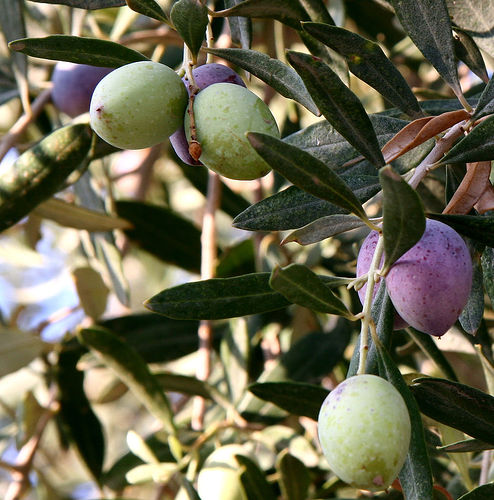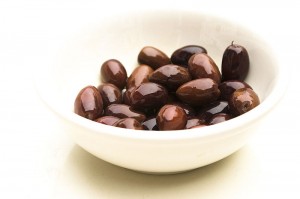Olives and Olive oil
2012

Olives are abundant in vitamin E, a powerful antioxidant and are high in healthy monounsaturated fats.
About – Olives are the fruit of a small tree native to southeastern Europe, western Asia and northern Africa and cultivated today primarily in Spain, Italy, Greece, and Turkey. Olives are of major agricultural importance in the Mediterranean region as the source of olive oil. The olive is a small drupe 1 – 3 cm long with wild olives being smaller and with a thinner flesh than cultivated olives. Olives are harvested at varying stages of ripeness; as they ripen they gradually turn from green to black. They are cured by soaking in oil, brine or water, or by dry packing in salt.

Nutrition – Olives are rich in vitamin E, iron and copper, and are an excellent source of fiber. Olives are rich in powerful antioxidants being high in vitamin E, a fat-soluble antioxidant that neutralizes damaging free radicals, as well as polyphenols and flavonoids, which have anti-inflammatory properties. They are very high in healthy monounsaturated fats, which are required by the body and are a key component of our cell membranes and are extremely important for proper cellular function. 75% of the olive is made up of oleic acid, a very healthy monounsaturated omega-9 fatty acid. They have been found to reduce the risk of atherosclerosis and increase HDL ‘good’ cholesterol. The olives combination of strong antioxidants with the cellular protection of its oleic acid makes them a powerful food against degenerative diseases
 Olive Oil is the oil obtained from the olive that has been used in the Mediterranean region for thousands of years. It is actually a pure fruit juice and unlike most seed or vegetable oils, it does not require any heat or chemicals to extract the oil and needs no refinement.
Olive Oil is the oil obtained from the olive that has been used in the Mediterranean region for thousands of years. It is actually a pure fruit juice and unlike most seed or vegetable oils, it does not require any heat or chemicals to extract the oil and needs no refinement.
Olive oil is high in monounsaturated fats, which have a positive effect on the cholesterol level in our blood streams. They act to keep cholesterol from sticking to our artery walls and are also thought to help control blood sugar. Olive oil is high in antioxidants, especially from its vitamin E content, and contains polyphenols, which give the olive its taste and aroma and are known to be antioxidant as well as anti-inflammatory and an anticoagulant. In some parts of the world high fat diets are associated with disease and bad health. In other parts of the world, such as the Mediterranean they are associated with lower rates of disease and good health. It is interesting that the places where fat is associated with bad health are areas such as America where hydrogenated fats, animal fats and corn oil predominates whereas in the Mediterranean, where they promote good health, olive oil is a primary source of fat in the diet.






